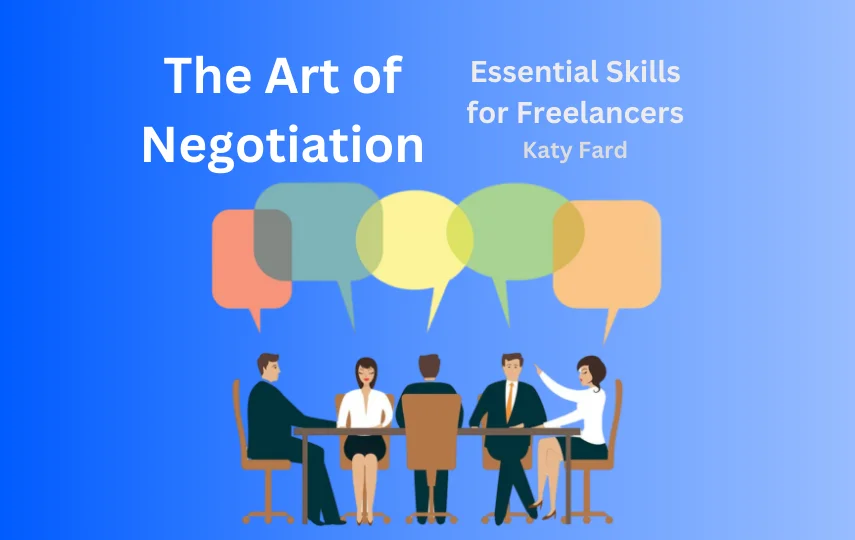Negotiation for freelancers is an inevitable part of a business. Whether it’s negotiating with clients, negotiating rates, or negotiating contracts, knowing how to negotiate effectively is critical to your success. Effective negotiation for freelancers can help to get better deals, build stronger relationships with clients, and increase your earning potential. In this article, we explore the art of negotiation and give you the essential skills to become an expert negotiator.
Why negotiation for freelancers is important?
As a freelancer, you might think that negotiation is only necessary for large businesses or companies. However, as a freelancer, you are also a business owner and service provider. Negotiation is essential to ensure you get what you’re worth and build strong relationships with your clients.
Below are some reasons why negotiation for freelancers is important:
1. Rates: As a freelancer, your rates are often the backbone of your business. Effective negotiation can help you achieve higher rates for your services, which can increase your earning potential.
2. Customer Relationships: Negotiation can help you build strong relationships with customers by showing that you are willing to listen to their needs and work together to find a mutually beneficial solution.
3. Project scope: Negotiation can help you clarify the scope and expectations of the project and reduce the risk of misunderstandings and miscommunications.
4. Payment terms: Negotiation can help you get better payment terms, such as late payments or early payment plans.
Essential skills for freelance negotiation
While negotiation for freelancers is an art that requires practice and experience, there are certain skills that can help you become a master negotiator. Here are some essential skills to focus on:
1. Know your value: Before starting any negotiation, know your value! Research market rates for your services and be prepared to justify your rates.
2. Set clear objectives: Set clear objectives for the negotiation, whether it’s securing higher rates or clarifying the scope of the project. Having clear objectives will help you stay focused and motivated during the negotiation.
3. Active listening: Active listening is very important in negotiation. Pay attention to what the other person is saying and show that you are interested in their concerns.
4. Empathy: Put yourself in the other person’s shoes and try to understand their point of view. This can help build trust and rapport.
5. Trust: Trust is key in negotiation. Believe in your worth and the value you bring.
6. Flexibility: Be flexible and open-minded during the negotiation process. Be willing to make compromises and find creative solutions.
7. Body Language: Non-verbal cues can play an important role in negotiation. Make sure your body language conveys confidence and positivity.
Tips for effective negotiation
Here are some tips to help you negotiate effectively as a freelancer:
1. Prepare in advance: Research the market rate for your services and prepare a good offer before starting any negotiations.
2. Start High: Start with a high bid or offer to leave room for compromise.
3. Use silence: Silence can be a powerful tool in negotiation. Use it to create tension or stop the conversation before making a counteroffer.
4. Look for win-win solutions: Focus on finding solutions that benefit both parties.
5. Be Transparent: Be transparent about your pricing structure and services offered.
6. Use Humor: Humor can help break the ice and create a calm atmosphere during the negotiation process.
Common scenarios for negotiation for freelancers
As a freelancer, you will encounter many different negotiation scenarios throughout your career. Below are some common scenarios to prepare for:
1. Rate Negotiation: When negotiating rates with clients, focus on the value you bring to their project and the benefits of hiring an experienced freelancer like yourself.
2. Project Scope: When negotiating project scope, clarify expectations and define deliverables ahead of time to avoid misunderstandings.
3. Payment Terms: When negotiating payment terms, consider offering different payment plans or options to meet your customers’ needs.
The best ways to negotiate with clients
Practicing active listening, empathy, confidence, flexibility, and body language, you’ll be well-equipped to navigate even the toughest negotiations. Remember to prepare in advance, use silence strategically, look for win-win solutions, be transparent, and use humor during negotiations.
By following these tips and best practices, you’ll be able to secure better deals, build stronger relationships with clients, and increase your earning potential as a freelancer.
Final Tips
Practice makes perfect: The more you negotiate, the more comfortable you’ll become with the process.
Stay calm under pressure: Keep your cool during negotiations, even when faced with resistance or pushback.
Learn from failures: Analyze what went wrong during failed negotiations and use those experiences as opportunities for growth.
By mastering the art of negotiation for freelancers, you’ll be able to achieve greater success in your career and build lasting relationships with your clients.


Hello Katy. In my experience, customer satisfaction is more important than cost when negotiating. These are long-term investments!
Amazing point Hildigunn!
It is very difficult to consider all these. Especially in the beginning🥲
Hello Atrin,
I know that the path may be difficult at first, but be sure that by gaining experience and using the experiences of others, you will soon find your way.
Thank you
My biggest question is how to tell the price Katy?
Hello Shanti,
Setting your prices as a freelancer means thinking about your skills, checking what others charge, figuring out your costs and how much you want to make, and showing clients the value in your work. Be clear and confident when talking about your rates, and make sure to explain what your price includes. It’s helpful to have different pricing options to attract clients with different budgets. Remember, your price should reflect your skills and the benefits you bring to clients, so both you and your clients are happy with the deal.
Thank you
Hello Katy Fard,
The fact that you mentioned the project scope in the freelance negotiation is a very important point because if all the issues and expectations are clear from the beginning, many inconveniences and misunderstandings will be prevented.
Hello,
You are absolutely right. Thank you for sharing.
Ms. Fard Can you explain about the art of persuasion?
Hello Yoona,
The art of persuasion involves influencing others to change their beliefs or actions. It combines effective communication and understanding people’s feelings. Techniques include building trust, telling stories, and making strong arguments. Similarly, the art of negotiation is about finding common ground and reaching agreements through dialogue. Both skills require active listening and empathy to understand others’ needs. We are going to write an article about it to explore these essential skills further.
Thank you.